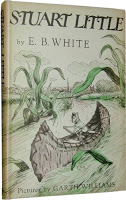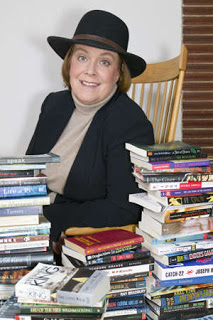Neuroscience
Two very interesting "sets of information" lately on my favorite children's books. (I say "sets of information" because one is a podcast of a lecture, and the other is an article / interview / podcast ... so what is the proper name for these bits of information? but I digress)
First, I read the article in last week's New Yorker about children's libraries, Anne Carroll Moore, arguably the mother of all children's librarians, and E.B. White's Stuart Little. Jill Lepore describes the "Department of Work with Children" at the New York Public Library and provides background on Anne Carroll Moore, the NYPL's first children's librarian, including details of how Moore championed good books for children. Lepore describes how Moore pestered White to write a book for children, but then recoiled from Stuart Little. Stuart himself prevailed, of course, and the rest of the article follows Stuart's progress. The New Yorker also includes a blog post by Lepore who "writes about how she got to the bottom of the Stuart Little battle" and a podcast discussion between Lepore and Roger Angell about the article.
Moore, arguably the mother of all children's librarians, and E.B. White's Stuart Little. Jill Lepore describes the "Department of Work with Children" at the New York Public Library and provides background on Anne Carroll Moore, the NYPL's first children's librarian, including details of how Moore championed good books for children. Lepore describes how Moore pestered White to write a book for children, but then recoiled from Stuart Little. Stuart himself prevailed, of course, and the rest of the article follows Stuart's progress. The New Yorker also includes a blog post by Lepore who "writes about how she got to the bottom of the Stuart Little battle" and a podcast discussion between Lepore and Roger Angell about the article.
Then I downloaded a podcast of Anita Silvey talking about some of the 100 best children's books to students and school librarians at Simmons Graduate School of Library & Information Science. I had the great fortune of taking Modern Book Publishing with Anita while I was at Simmons, and she is terrific storyteller. In this lecture Anita gives, in her words, "30 short book talks," which turns out to be 1-2 minutes about some delightful books for children and young adults. I was enthralled for virtually all of the talk, and I learned many interesting tidbits about some of my favorite children's books like ...
If you like (or liked) children's books, or if you have children who read, I highly recommend both the New Yorker article and the Anita Silvey lecture.
For More Information
- Toddlers Find Photos Easier To Learn From Than Drawings
It's a quintessential part of many a childhood: sitting atop mum or dad's knee while they read in soothing tones from a beautifully illustrated picture book. But just how much can young children learn from picture books, and does the quality of...
- Promoting Academic Writing
Interesting piece in today's New York Times about writers taking promotional book "tours" via blogs: The Author Will Take Q.’s Now By KARA JESELLA Published: September 2, 2007 [snip] Bloggers have written about books since, well, the beginning of...
- A Good Laugh
I often quote from Ranganathan's Five Laws of Library Science. Here they are, in case you haven't committed them to memory: Books are for use.Every reader his [or her] book.Every book its reader.Save the time of the User.The library is a growing...
- Funability In Danbury
The Loose Cannon Librarian has done a very cool thing: she's mashed the Danbury Library catalog with the social networking tools of Library Thing for Libraries (read more about it on the Library Thing blog). If you look for a book & want to find "more...
- Readers' Advisory Via Librarything?
Heard Tim Spaulding's talk at last October's NEASIS&T Embedded Library program (link to podcast & more info) about LibraryThing and I got inspired. I'd heard about it for ages, of course, but finally I had some time to play with it today....
Neuroscience
Favorite Children's Books
Two very interesting "sets of information" lately on my favorite children's books. (I say "sets of information" because one is a podcast of a lecture, and the other is an article / interview / podcast ... so what is the proper name for these bits of information? but I digress)
First, I read the article in last week's New Yorker about children's libraries, Anne Carroll
 Moore, arguably the mother of all children's librarians, and E.B. White's Stuart Little. Jill Lepore describes the "Department of Work with Children" at the New York Public Library and provides background on Anne Carroll Moore, the NYPL's first children's librarian, including details of how Moore championed good books for children. Lepore describes how Moore pestered White to write a book for children, but then recoiled from Stuart Little. Stuart himself prevailed, of course, and the rest of the article follows Stuart's progress. The New Yorker also includes a blog post by Lepore who "writes about how she got to the bottom of the Stuart Little battle" and a podcast discussion between Lepore and Roger Angell about the article.
Moore, arguably the mother of all children's librarians, and E.B. White's Stuart Little. Jill Lepore describes the "Department of Work with Children" at the New York Public Library and provides background on Anne Carroll Moore, the NYPL's first children's librarian, including details of how Moore championed good books for children. Lepore describes how Moore pestered White to write a book for children, but then recoiled from Stuart Little. Stuart himself prevailed, of course, and the rest of the article follows Stuart's progress. The New Yorker also includes a blog post by Lepore who "writes about how she got to the bottom of the Stuart Little battle" and a podcast discussion between Lepore and Roger Angell about the article.Then I downloaded a podcast of Anita Silvey talking about some of the 100 best children's books to students and school librarians at Simmons Graduate School of Library & Information Science. I had the great fortune of taking Modern Book Publishing with Anita while I was at Simmons, and she is terrific storyteller. In this lecture Anita gives, in her words, "30 short book talks," which turns out to be 1-2 minutes about some delightful books for children and young adults. I was enthralled for virtually all of the talk, and I learned many interesting tidbits about some of my favorite children's books like ...

- One series of books was written by a mother and daughter, although only the mother was credited as the author.
- One picture book was rejected over 20 times, and one of my all-time favorite YA books was also rejected over 20 times.
- One picture book was written during WWII and could be used today to comfort children who are concerned about family members fighting in Iraq.
- One series of books was written by two German Jews and was smuggled out of France shortly before the Nazis invaded Paris.
If you like (or liked) children's books, or if you have children who read, I highly recommend both the New Yorker article and the Anita Silvey lecture.
For More Information
- Lepore, Jill. The Lion and the Mouse: The Battle that Reshaped Children’s Literature. The New Yorker, July 21, 2008.
- --- The Book Bench: Jill Lepore writes about how she got to the bottom of the “Stuart Little” battle. (blog post)
- --- and Roger Angell discuss “Stuart Little” and children’s literature (podcast)
- Silvey, Anita. The Stories Behind the Classics April 26, 2008, Student School Library Conference @ Simmons College GSLIS.
- --- 100 Best Books for Children, Boston : Houghton Mifflin, 2004 and 500 Great Books for Teens, Boston : Houghton Mifflin, 2006.
- Toddlers Find Photos Easier To Learn From Than Drawings
It's a quintessential part of many a childhood: sitting atop mum or dad's knee while they read in soothing tones from a beautifully illustrated picture book. But just how much can young children learn from picture books, and does the quality of...
- Promoting Academic Writing
Interesting piece in today's New York Times about writers taking promotional book "tours" via blogs: The Author Will Take Q.’s Now By KARA JESELLA Published: September 2, 2007 [snip] Bloggers have written about books since, well, the beginning of...
- A Good Laugh
I often quote from Ranganathan's Five Laws of Library Science. Here they are, in case you haven't committed them to memory: Books are for use.Every reader his [or her] book.Every book its reader.Save the time of the User.The library is a growing...
- Funability In Danbury
The Loose Cannon Librarian has done a very cool thing: she's mashed the Danbury Library catalog with the social networking tools of Library Thing for Libraries (read more about it on the Library Thing blog). If you look for a book & want to find "more...
- Readers' Advisory Via Librarything?
Heard Tim Spaulding's talk at last October's NEASIS&T Embedded Library program (link to podcast & more info) about LibraryThing and I got inspired. I'd heard about it for ages, of course, but finally I had some time to play with it today....
